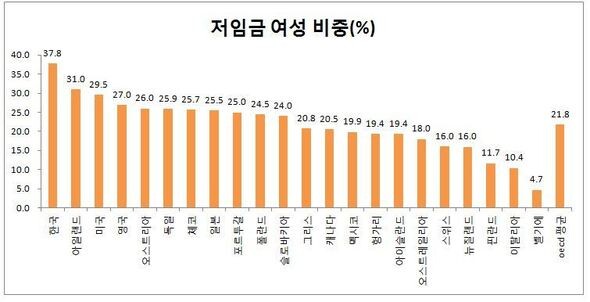hankyoreh
Links to other country sites 다른 나라 사이트 링크
4 out of 10 working women in S. Korea stuck in low-wage work

Roughly four in ten working women suffer from low-wages, a study shows. The rate is the highest among Organisation for Economic Co-operation and Development (OECD) member countries.
According to figures released by the OECD on Sept. 18, 37.8% of female workers in 2014 were engaged in low-wage work, a category that refers to cases where wages fall below two-thirds of the median. The percentage was the largest among 22 comparable OECD members.
The rate of low-wage employment of women has been steadily decreasing, falling from 45.8% in 2000 to below 40% since 2011.
But the rate of low-wage employment for South Korean women remains very high. The next-highest-ranking OECD member, Ireland, scored 6.8 percentage points lower at 31.0%. The US rate is 29.5%, while Germany and Japan have respective rates of 25.9% and 25.5%. The OECD average is 21.8%.
The high rate of women in low-wage work is also a key factor increasing the overall percentage of low-wage work. While South Korea ranked roughly in the middle (11th) in terms of the percentage of men in low-wage work at 15.4%, its total low-wage labor percentage for both men and women was 23.7%, ranking it third after Ireland (25.1%) and the US (24.9%).
The numbers result from the fact that many working women work in poor-quality positions such as daily work and unskilled labor - and are also closely tied to the fact that women whose careers were interrupted by childbirth and child-raising typically find themselves in vulnerable jobs. A recent report by the International Monetary Fund (IMF) identified women’s low rate of participation in economic activity and an environment disadvantageous to women as structural issues with the South Korean labor market.
“It’s important to establish an institutional environment where highly educated women can enter the labor market and maintain jobs and careers,” said Korea Labor Institute expert committee member Jung Sung-mi.
By Kim Kyung-rok, staff reporter
Please direct questions or comments to [english@hani.co.kr]

Editorial・opinion
![[Column] Has Korea, too, crossed the Rubicon on China? [Column] Has Korea, too, crossed the Rubicon on China?](https://flexible.img.hani.co.kr/flexible/normal/500/300/imgdb/original/2024/0419/9317135153409185.jpg) [Column] Has Korea, too, crossed the Rubicon on China?
[Column] Has Korea, too, crossed the Rubicon on China?![[Correspondent’s column] In Japan’s alliance with US, echoes of its past alliances with UK [Correspondent’s column] In Japan’s alliance with US, echoes of its past alliances with UK](https://flexible.img.hani.co.kr/flexible/normal/500/300/imgdb/original/2024/0419/2317135166563519.jpg) [Correspondent’s column] In Japan’s alliance with US, echoes of its past alliances with UK
[Correspondent’s column] In Japan’s alliance with US, echoes of its past alliances with UK- [Editorial] Does Yoon think the Korean public is wrong?
- [Editorial] As it bolsters its alliance with US, Japan must be accountable for past
- [Guest essay] Amending the Constitution is Yoon’s key to leaving office in public’s good graces
- [Editorial] 10 years on, lessons of Sewol tragedy must never be forgotten
- [Column] A death blow to Korea’s prosecutor politics
- [Correspondent’s column] The US and the end of Japanese pacifism
- [Guest essay] How Korea turned its trainee doctors into monsters
- [Guest essay] As someone who helped forge Seoul-Moscow ties, their status today troubles me
Most viewed articles
- 1[Column] The clock is ticking for Korea’s first lady
- 2After 2 months of delayed, denied medical care, Koreans worry worst may be yet to come
- 3[Column] Has Korea, too, crossed the Rubicon on China?
- 4US overtakes China as Korea’s top export market, prompting trade sanction jitters
- 5[Correspondent’s column] In Japan’s alliance with US, echoes of its past alliances with UK
- 6[Editorial] When the choice is kids or career, Korea will never overcome birth rate woes
- 7Hong Se-hwa, voice for tolerance whose memoir of exile touched a chord, dies at 76
- 8All eyes on Xiaomi after it pulls off EV that Apple couldn’t
- 9More South Koreans, particularly the young, are leaving their religions
- 10John Linton, descendant of US missionaries and naturalized Korean citizen, to lead PPP’s reform effo